You’ve spent lots of time and effort creating relationships with your clients, and they trust you enough to spend their money with you.
It’d be a shame to only get in touch with them once a year for a renewal – that’s akin to being the friend who only calls when they need something. But why else should you contact them, and how often? And what did we talk about last time?
These questions can be easily answered with a customer relationship management (CRM) system.
Do You Need a CRM?
Paper is comfortable - you can touch it, write on it, and sit it on your desk. But it’s not efficient.

Say you have a file cabinet full of client files, and you want to know which clients have Med Supp policies with Aetna. How long would that take you? Or which clients are in the 600-608 zip code range? This is precisely what computers are made for – storing and retrieving data efficiently.
While throwing the files away may seem drastic, the fact is that they aren’t needed in many cases, and you can work much more efficiently using a customer relationship management system, or CRM. But, what does CRM mean anyway?
What's a CRM System?
A CRM system helps you:
- Stay connected with your clients
- Automate and streamline your processes
- Organize all of your client information
A CRM for Medicare agents has specific attributes that makes client and policy management simple.
- You can store policy information on a client's contact record that makes it easy to schedule upcoming renewals.
- You can quickly look up all clients who have policies with a certain company.
- You can find out who has an upcoming birthday
- You can keep notes about your appointments.

And those are just a few examples of things you can do in a CRM specific to the insurance sector.
In sum, a CRM system helps you become organized and efficient.
Benefits of a CRM In the Insurance Sector
There are lots of different CRMs out there, and they vary in price and capabilities, but most of them share some common features. These include:
- Store client information
- Track interactions
- Tasks and reminders
- Document management
- Reporting
There are simple CRMs that are more generic, and can be used by anyone, and then there are customized systems that are tailored to every industry.
The insurance industry has dozens of options, and these are even split into niches, such as P&C and health insurance. Choosing an industry-specific CRM usually adds more features, such as:
- Carrier information
- Policy information
- Commission processing
- Office collaboration
- Workflow automation
- Mobile app
Here’s a common scenario: you get a call from a prospect. You answer their questions and offer suggestions. Either during or immediately after the call, you look up the person in your CRM. This usually only requires typing a few letters of their name to find them.
If the person is already in your system, you’d simply update their info and add a note about your conversation. Then you add a followup reminder for a few days from now. Once that date arrives, your CRM alerts you that you need to followup.
When you stop trying to remember everything and let your CRM do that for you, fewer opportunities fall through the cracks!

Top CRM Software For Insurance Agents
First off, there is no “perfect system.” Each one has its strengths and weaknesses, so I recommend setting up demos of any systems you’re interested in. Most likely, you’ll find something that's close to what you want.
Some things to consider when choosing:
- Support: do you need help, and if so, via phone or email?
- Price: there are free CRMs and ones that can cost hundreds per month
- Purchase and install, or web-based subscription
- Training: 1-on-1 sessions, web videos, or just help pages?
- Ease of use: is it intuitive?
- Ability to connect to other systems: no system will handle every aspect of your business
So which ones should you check out? Agents use all kinds of CRMs happily, including ones that aren't insurance-specific, so check out our full analysis here: Best CRM Software for Insurance Agents In the Senior Market
We go into much more detail on insurance industry-specific CRMs like AgencyBloc and Radiusbob as well as some free options, like a light version of HubSpot or Zoho CRM.
Conclusion
Many agents find themselves saying "you don't need a CRM." They continue to do everything with paper files and filing cabinets, and that's fine. Not everyone wants to go digital, even if it will save you a lot of headache and time.
But the benefits of a CRM, particularly for insurance agents, outweighs the hassle of learning how it works and setting it up. It will save you hundreds of hours and will allow you to more effortlessly service your clients.
And as I mentioned, you won’t find the “one true system,” and whichever one you choose isn’t that important as long as you choose one. If you’ll start using a CRM system – and commit to using it consistently – you’ll likely discover all sorts of benefits, such as:
- Increased sales
- Better organization
- Better communication with your clients and prospects
Are you already using a CRM? Let me know which one in the comments below, and what do you like or dislike about it?







